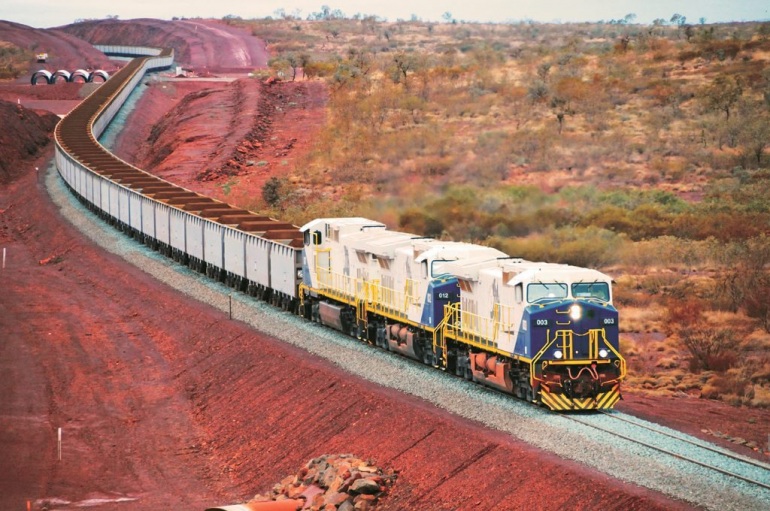China's shock and ore at the Australian way

A handout image made available by Australian Fortescue Metals Group Ltd showing a Fortescue train at an undisclosed location in Australia. (EPA/FORTESCUE METALS GROUP LTD)
CITIC Pacific’s Sino Iron project produced its much-awaited first shipment of iron ore concentrate in December last year, $US6 billion over budget and four years behind schedule.
Though the biggest Chinese mining project in Australia has barely started production, it has already been widely perceived as a failure. It has already claimed the scalp of Larry Yung, the former chairman of CITIC and a member of China’s red aristocracy, who has lost $2 billion as a result of his foreign exchange bets.
When Western Australian premier Colin Barnett and CITIC chairman Chang Zhenming shook hands at Cape Preston to celebrate CITIC’s first shipment, they spoke glowingly about the future of the project and the ever-growing bond between the two countries.
Prime Minister Tony Abbott also sent his congratulatory message. “This shipment is a vote of confidence in Australia and in our mining industry,” he said.
However, the Chinese seemed far more circumspect about their investment once they paid obligatory compliments to their hosts and offered a candid post-mortem assessment to a small group of invited Chinese reporters.
CITIC and its principal contractor, the Metallurgical Corporation of China (MCC), severely underestimated the cost of construction in Australia. The budget soared from $US1.75 billion in June 2007 to $US4.3 billion at the end of December 2011.
“We don’t understand the actual conditions of building large mining projects in Australia. We tried to apply our lessons learnt in China locally and severely underestimated the difficulty of the project. As a result, we went on a detour,” Chang told the People’s Daily.
One of MCC’s cardinal sins was to misjudge Australia’s tough immigration control. Chinese contractors thought they could bring in battalions of cheap and skilled Chinese construction workers. Despite its intensive lobbying in Canberra, MCC could only bring in a small contingent of qualified workers.
In fact, CITIC senior executives even had to take turns to cook as they could not bring in a Chinese chef.
At the peak of construction, CITIC employed 4,000 construction workers and Chinese workers accounted for less than 5 per cent of the total workforce. Chang was further shocked by high wages in Western Australia. He told bewildered Chinese reporters that a truck driver in WA earned $150,000 on average, or about 800,000 yuan (17 times China’s average urban salary).
Business Spectator understands CITIC Resources’ top man in Australia earns roughly the same salary as the truck driver that he employs.
Chinese workers are usually quite happy to put up with basic conditions and several workers often cramp into a single room. Based on that assumption, CITIC’s contractors thought $30 million would be enough to build living quarters for workers.
However, they ended up building a little resort town with gyms, swimming pool, shops and spacious air-conditioned accommodation quarters. The budget ballooned from $30 million to $300 million, said Zhang Jijing, chief executive of the CITIC Pacific Sino Iron project.
Generous Australian working conditions also caused Chinese contractors to scratch their heads, who are accustomed to ordering their workforce to slog away day and night to meet deadlines. Instead, they have to deal with workers who will only work nine days and then take five days off.
Zhang, chairman of CITIC Pacific Mining since May last year, also highlights some other unforeseen difficulties: crabs and sacred indigenous sites.
The company had to build a bridge at a cost of $US60 million to help the movements of crabs in a protected area. This probably wouldn’t surprise Australian miners, but for the Chinese who are used to much lower standard of environmental protection, it came as a rude awakening.
Negotiation with indigenous people is also a tough challenge for a company that has no experience in dealing with native title issues. “We must negotiate and remove every sacred site within the mining area with the local indigenous tribes. That took us an entire year and we didn’t think about that at all during the initial planning stage,” Zhang told Chinese reporters.
CITIC Pacific’s project in WA is without doubt one of the most expensive lessons for Chinese investors in Australia. The former president of BHP China, Clinton Dines, distils the $US6 billion tutorial succinctly.
“Firstly, that Chinese companies are not always equipped to be successful buyers, owners and operators of overseas projects,” he said, “Secondly, Chinese government thinking is gradually evolving towards the conclusion that security of supply does not necessarily require ownership of these assets".
Follow Peter Cai on Twitter: @peteryuancai
Subscribe to the China Spectator newsletter: http://bit.ly/ChinaSpec
















